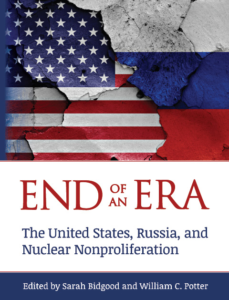August 23, 2021
Sarah Bidgood and William C. Potter
US-Russian cooperation on nuclear nonproliferation has reached an inflection point. Policy makers in both capitals must now decide whether the risks posed by the spread of nuclear weapons are great enough to merit their renewed engagement—or whether the challenges in their bilateral relationship make it impossible to collaborate in this vital sphere. The election of President Joseph R. Biden offers the potential for a more pragmatic US approach to nuclear cooperation with Russia—one aimed at reducing the mutual threats perceived by both countries. At the same time, however, both the Biden and Putin administrations will face significant domestic political opposition should they choose to revive their joint work in the nuclear sector and attempt to isolate it from other contentious issues that have plagued their relationship.
Recognizing these challenges, End of an Era: The United States, Russia, and Nuclear Nonproliferation identifies nonproliferation challenges that merit US-Russian cooperation and provides suggestions about specific measures that might usefully be pursued. These suggestions are drawn from the seven case studies, which describe instances in which the United States and Russia previously have been able to find common ground, even during periods of considerable tension in their bilateral relationship. Building upon the editors’ 2018 publication, Once and Future Partners: The United States, Russia, and Nuclear Non-proliferation, the present volume distills this history into lessons for contemporary policy makers, scholars, and students of US-Russia nuclear policy. While not a panacea, the recommendations offer practical opportunities to adopt more constructive US-Russia nuclear relations.
Read End of an Era: The United States, Russia, and Nuclear Nonproliferation
Chapter List
- Chapter 1: US-Russian Cooperation to improve Security for Nuclear Weapons and Materials
Matthew Bunn - Chapter 2: UN Security Council Resolution 1929 on Iran: US-Russian Cooperation and the Quest for Diffuse Reciprocity
Hanna Notte - Chapter 3: Moving beyond Self-Restraint: Bilateral Commercial Nuclear Supply and US-Russian Tacit Understanding on Nuclear Security and International Safeguards
Adam N. Stulberg and Jonathan Darsey - Chapter 4: Cooperating Unilaterally: The 1991-1992 Presidential Nuclear Initiatives
Jeremy Faust - Chapter 5: Saving the World Twice Over: How Addressing Climate Change Provides Opportunities for US-Russian Cooperation
Aubrey Means - Chapter 6: US-Soviet/Russian Cooperation on Article VI of the NPT
Nikolai Sokov - Chapter 7: When Interests Align: How US-Russian Cooperation on HEU Minimization Endures
Noah Mayhew - Chapter 8: Reflections on the Past and Thoughts about the Future
William C. Potter and Sarah Bidgood
About the Editors
Sarah Bidgood directs the Eurasia Nonproliferation Program at the James Martin Center for Nonproliferation Studies at the Middlebury Institute of International Studies at Monterey. Her research focuses on US-Russia relations and the international nonproliferation regime.
Dr. William C. Potter directs the James Martin Center for Nonproliferation Studies and is Sam Nunn and Richard Lugar Professor of Nonproliferation Studies at the Middlebury Institute of International Studies at Monterey. Trained as a Sovietologist, he has participated as a delegate at every NPT meeting since 1995.

